How can I uppercase the fisrt letter of a NSString, and removing any accents ?
For instance, Àlter, Alter, alter should become Alter.
But, /lter, )lter, :lter should remains the same, as the first character is not a letter.
How can I uppercase the fisrt letter of a NSString, and removing any accents ?
For instance, Àlter, Alter, alter should become Alter.
But, /lter, )lter, :lter should remains the same, as the first character is not a letter.
Please Do NOT use this method. Because one letter may have different count in different language. You can check dreamlax answer for that. But I'm sure that You would learn something from my answer.
NSString *capitalisedSentence = nil;
//Does the string live in memory and does it have at least one letter?
if (yourString && yourString.length > 0) {
// Yes, it does.
capitalisedSentence = [yourString stringByReplacingCharactersInRange:NSMakeRange(0,1)
withString:[[yourString substringToIndex:1] capitalizedString]];
} else {
// No, it doesn't.
}
Why should I care about the number of letters?
If you try to access (e.g NSMakeRange, substringToIndex etc)
the first character in an empty string like @"", then your app will crash. To avoid this you must verify that it exists before processing on it.

nil will observe any method call you send to it.
So it will digest anything you try on it, nil is your friend.
You can use NSString's:
- (NSString *)capitalizedString
or (iOS 6.0 and above):
- (NSString *)capitalizedStringWithLocale:(NSLocale *)locale
Since you want to remove diacritic marks, you could use this method in combination with the common string manipulating methods, like this:
/* create a locale where diacritic marks are not considered important, e.g. US English */
NSLocale *locale = [[[NSLocale alloc] initWithLocaleIdentifier:@"en-US"] autorelease];
NSString *input = @"Àlter";
/* get first char */
NSString *firstChar = [input substringToIndex:1];
/* remove any diacritic mark */
NSString *folded = [firstChar stringByFoldingWithOptions:NSDiacriticInsensitiveSearch locale:locale];
/* create the new string */
NSString *result = [[folded uppercaseString] stringByAppendingString:[input substringFromIndex:1]];
Since iOS 9.0 there is a method to capitalize string using current locale:
@property(readonly, copy) NSString *localizedCapitalizedString;
Gonna drop a list of steps which I think you can use to get this done. Hope you can follow through without a prob! :)
decomposedStringWithCanonicalMappingto decompose any accents (Important to make sure accented characters aren't just removed unnecessarily)upperCaseString to turn it into capitol lettering and use stringByReplacingCharactersInRange to replace the first letter back into the original string. [theString stringByReplacingOccurrencesOfString:@"" withString:@""]` sort of call to remove any accents left over.This all should both capitalize your first letter AND remove any accents :)
I'm using this method for similar situations but I'm not sure if question asked to make other letters lowercase.
- (NSString *)capitalizedOnlyFirstLetter {
if (self.length < 1) {
return @"";
}
else if (self.length == 1) {
return [self capitalizedString];
}
else {
NSString *firstChar = [self substringToIndex:1];
NSString *otherChars = [self substringWithRange:NSMakeRange(1, self.length - 1)];
return [NSString stringWithFormat:@"%@%@", [firstChar uppercaseString], [otherChars lowercaseString]];
}
}
Just for adding some options, I use this category to capitalize the first letter of a NSString.
@interface NSString (CapitalizeFirst)
- (NSString *)capitalizeFirst;
- (NSString *)removeDiacritic;
@end
@implementation NSString (CapitalizeFirst)
- (NSString *)capitalizeFirst {
if ( self.length <= 1 ) {
return [self uppercaseString];
}
else {
return [[[[self substringToIndex:1] removeDiacritic] uppercaseString] stringByAppendingString:[[self substringFromIndex:1] removeDiacritic]];
// Or: return [NSString stringWithFormat:@"%@%@", [[[self substringToIndex:1] removeDiacritic] uppercaseString], [[self substringFromIndex:1] removeDiacritic]];
}
}
- (NSString *)removeDiacritic { // Taken from: http://stackoverflow.com/a/10932536/1986221
NSData *data = [NSData dataUsingEncoding:NSASCIIStringEncoding
allowsLossyConversion:YES];
return [[NSString alloc] initWithData:data
encoding:NSASCIIStringEncoding];
}
@end
And then you can simply call:
NSString *helloWorld = @"hello world";
NSString *capitalized = [helloWorld capitalizeFirst];
NSLog(@"%@ - %@", helloWorld, capitalized);